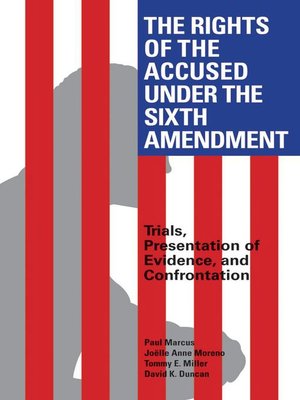
Sign up to save your library
With an OverDrive account, you can save your favorite libraries for at-a-glance information about availability. Find out more about OverDrive accounts.
Find this title in Libby, the library reading app by OverDrive.



Search for a digital library with this title
Title found at these libraries:
| Loading... |
This essential resource takes a close look at The Sixth Amendment to the United States Constitution and those key provisions which impact mightily on defendants in criminal prosecutions. The book was authored by four noted legal professionals, each from different backgrounds (private practice of law, former prosecutors, academics, jurists) and from different parts of the nation. This fascinating book examines the wide range of essential criminal justice topics that fall within the scope of the Sixth Amendment, including: • The Right to a Speedy Trial examines the significance and evolution of this right throughout our time as an independent nation. To fully understand the scope and application of the speedy trial right, one must also examine the overlapping state and federal statutory schemes, the reach of the constitutional provision, and the state and federal rules of criminal procedure. • The Right to a Public Trial occupies a central role in our longstanding effort to ensure fairness in the criminal justice system and the process of charging and trying a criminal defendant. Discover the complicated issues surrounding the closure of trial proceedings and the related determination of which rules govern the closure of pretrial proceedings. • The Right to a Jury Trial seems essential to our system of criminal justice. Still, numerous questions have arisen as to the application of this right. The distinction between petty and non-petty offenses remains important today, as do issues surrounding the deadlocked jury, the size and composition of juries, and the application of the right to non-traditional criminal matters such as juvenile proceedings and deportation actions. • The Place of Prosecution provision is the only section specifically mentioned twice in the Constitution. On its face, the right might seem fairly obvious. In practice, however, the problems created by this provision--and their myriad solutions--are far from obvious. • The Right to be informed of the Nature and Cause of the Accusations encompasses a range of significant and complex practical and constitutional concerns. Moreover, numerous practice issues are implicated including: waiver of rights, sufficiency of the indictment, claims of duplicity or multiplicity, and requests for bills of particulars. • The Confrontation Clause has been an important component of criminal trials throughout our legal history, but the United States Supreme Court paid little in depth attention to it until fairly recently as the Confrontation Clause has been the most robust area of new Sixth Amendment jurisprudence. • The Compulsory Process Clause guarantees the defendant's right to obtain witnesses on his behalf. The history of compulsory process reveals a dramatic shift in the way this provision is viewed over the centuries resulting in far greater protections for the accused. Modern disputes generally focus on interference with the right by the prosecution, the application of the right as to confidential informants, and the role of use immunity. This book is an essential resource for judges, academics, and lawyers working in the field. It offers fascinating historical perspective, modern interpretations, and insight on this critical component of the United States Constitution. It's one book that is a must for every lawyer's library.






